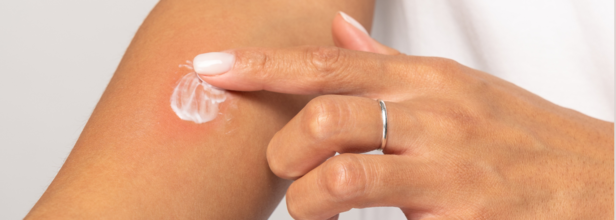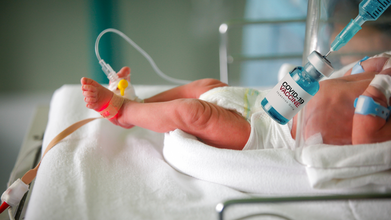- Health Conditions A-Z
- Health & Wellness
- Nutrition
- Fitness
- Health News
- Ayurveda
- Videos
- Medicine A-Z
- Parenting
6 Treatments To Get Rid Of Ringworms

Ringworm treatment
Ringworm is a common, highly contagious fungal infection and more easily managed than the name might suggest. Scientifically known as tinea corporis, this skin infection thrives in warm, moist environments but can occur in all climates. The good news? With the right treatments and hygiene practices, you can get rid of ringworm effectively and prevent its return.
Ringworm can be quite difficult at times, but with proper treatment options and hygiene practices, it becomes pretty manageable. Whether mild or persistent, acting fast with a proper treatment will surely help you get rid of the infection and make it not come back.
If you are unsure, see your healthcare provider to discuss stronger treatment options to ensure a speedy recovery. Keeping proactive will help you maintain this pesky fungal infection at bay and keep enjoying healthy, ringworm-free skin.
Ringworm is caused by fungi that normally live in our nails, skin, and hair. These fungi are generally benign but multiply when the environment is warm and humid.
You can get ringworm through:
- Direct skin-to-skin contact with an infected person.
- Pets, especially cats and dogs, and livestock like cows are common carriers.
- Shared towels, combs, clothes, or even contaminated surfaces can harbor the fungi.
- Walking barefoot or handling infected soil can lead to an infection.
Who Is at Risk?
Although anyone can get ringworm, some factors increase the susceptibility:
- Weakened immune system because of autoimmune diseases or diabetes.
- Warm, humid climates or activities that cause excessive sweating.
- Living in close contact with other people, such as shared housing, locker rooms, or military settings.
- Wearing tight clothing or not drying off well after bathing.
- Playing contact sports, such as wrestling or football.
Treatment of Ringworm
Ringworm treatment involves a combination of antifungal medication and good hygiene. Here's a step-by-step guide to manage the infection properly:
1. Topical Antifungal Creams, Lotions, or Powders
Most ringworm infections can be treated at home using OTC antifungal creams, lotions, or powders.
- Wipe the affected area clean and apply a thin layer of the medication. Extend application slightly beyond the rash to prevent spread.
- Apply twice daily for 2–4 weeks, or as directed, even after symptoms improve to ensure the fungus is eradicated.
2. Let the Rash Breathe
While it would seem intuitive to cover the rash, bandages can retain moisture and delay healing. Instead, use loose-fitting, light, breathable clothing to keep the area dry and prevent the spread.
3. Bathe bedding and clothes daily
Fungal spores can linger on bedding and clothing, prolonging the infection and risking reinfection. Wash your sheets, towels, and clothes daily using hot water and detergent. For added protection, include borax or bleach in the wash, which kills fungal spores.
4. Change Wet Socks and Underwear
Ringworm thrives on moist environments, and so you can say sweaty socks and underwear are a culprit in the prolongation of an infection. Keep these places dry and change clothes as frequently as possible if you happen to sweat during the day.
5. Utilize Antifungal Shampoo for Scalp Infection
If ringworm starts appearing on your scalp where you experience hair loss, dandruff, or boils, an antifungal shampoo will help you to get rid of this. These shampoos contain the following:
- Ketoconazole
- Selenium sulfide
- Pyrithione zinc
Follow the product's instructions and use regularly until the infection clears.
6. Consider Prescription Antifungals
If OTC treatments aren't effective after two weeks, see a healthcare provider. Prescription-strength topical creams or oral antifungal medications may be needed, especially for severe or widespread infections.
Hygienic Practices for Speedy Recovery
Cleanliness plays a vital role in treating and preventing ringworm:
- Clean frequently touched surfaces and personal belongings.
- Bathe your pet bedding if your pet is infected.
- Do not share personal items such as towels, combs, or clothing.
- For athlete's foot, disinfect or replace shoes to remove fungal spores.
Preventing Future Ringworm Infections
Prevention is the best way to prevent recurring infections:
- Keep yourself clean and dry your skin completely after bathing, especially in areas that sweat easily.
- Avoid walking barefoot in public showers or locker rooms.
- Treat infected pets promptly and wash your hands after handling animals.
- Wear breathable fabrics to minimize sweat buildup.
COVID Vaccination Is Not Linked To Reduce In Childbirth, Says Study

Credits: iStock and Canva
A large population-based study from Linköping University in Sweden has found no evidence that COVID-19 vaccination caused a decline in childbirth during the pandemic, countering persistent rumors that mRNA vaccines affect fertility. The findings have been published in the peer-reviewed journal Communications Medicine.
The study was conducted amid widespread misinformation, particularly on social media, suggesting that COVID-19 vaccines reduce the chances of becoming pregnant. These claims gained traction as several countries, including Sweden, recorded a drop in birth rates during the later stages of the pandemic, prompting questions about a possible link to vaccination.
“Our conclusion is that it’s highly unlikely that the mRNA vaccine against COVID-19 was behind the decrease in childbirth during the pandemic,” said Toomas Timpka, professor of social medicine at Linköping University and one of the study’s authors.
Why Researchers Investigated the Claim
Since the early months of the pandemic, unverified claims about vaccines and fertility have circulated widely online. When official data later showed fewer babies being born in some regions, researchers decided to examine whether vaccination could plausibly explain the trend or whether other social and demographic factors were at play.
Read: Ahmedabad Toddler Swallows Hulk Toy, Showed X-Ray, Doctors Remove It Via Endoscopy
To address the issue, the research team carried out an extensive analysis using real-world healthcare data rather than surveys or self-reported outcomes.
Study Looks at Nearly 60,000 Women
The study analyzed health records of all women aged 18 to 45 years living in Region Jönköping County, a region with a total population of around 369,000 people. This amounted to nearly 60,000 women included in the analysis.
Between 2021 and 2024, about 75 per cent of these women received at least one dose of a COVID-19 vaccine. Researchers examined data on childbirths, registered miscarriages, vaccination status and deaths using official healthcare records, allowing for a comprehensive comparison between vaccinated and unvaccinated groups.
Importantly, the researchers adjusted their analysis for age, recognizing that age is one of the most significant factors influencing fertility and pregnancy outcomes.
No Difference in Births or Miscarriages
When childbirth rates were compared between vaccinated and unvaccinated women, the researchers found no statistically significant difference. The same held true for miscarriage rates among women who became pregnant during the study period.
“We see no difference in childbirth rates between those who have taken the vaccine and those who haven’t,” said Timpka. “We’ve also looked at all registered miscarriages among those who became pregnant, and we see no difference between the groups there either.”
These findings align with several earlier international studies that have similarly found no association between COVID-19 vaccination and reduced fertility.
Other Factors Likely Behind Falling Birth Rates
According to the researchers, the decline in childbirth observed during the pandemic is more plausibly explained by broader demographic and social trends.
People currently in their 30s, the age group most likely to have children, were born in the second half of the 1990s. That period was marked by economic challenges and lower birth rates in Sweden, meaning today’s pool of potential parents is smaller than in previous generations.
In addition, pandemic-related factors such as health concerns, economic uncertainty, delayed family planning and lifestyle changes during lockdowns may have contributed to fewer pregnancies.
One of the study’s key strengths is its large, representative sample drawn from an entire region rather than a selected group. By using verified healthcare records and accounting for age-related effects, the researchers aimed to minimize bias and improve reliability.
The study received financial support from several sources, including the Swedish Research Council.
These Are The 2 Major Reasons For Cancer, Says WHO

Credits: Canva
In 2022, there were almost 20 million new cases of cancer and 9.7 million cancer-related deaths worldwide, noted the National Cancer Institute (US). By 2050, it is predicted that the number of new cancer cases will rise to 33 million per year, with deaths rising to 18.2 million. While there are many reasons for cancer, a new comprehensive study by the World Health Organization (WHO) revealed that there are two major habits that are the leading cause of cancer.
As per WHO, more than 38% of cancer cases worldwide are linked to modifiable risk factors. The study is published in the journal Nature Medicine and it suggests that millions of diagnoses each year could be avoided through lifestyle changes, medical interventions, and environmental improvements.
WHO Study Says These 2 Major Habits Could Cause Cancer
Tobacco Use
As per the Association of Tobacco Use and Cancer Incidence, in India, the risk of any cancer with smoke and smokeless tobacco is 2.71 and 2.68, respectively. The study noted that risk of cancer due to tobacco use is consistent especially in India. Site-specific analysis showed higher risks of respiratory system cancers of 4.97 and head and neck cancers of 3.95.
As per several studies, including Cancer Research UK and National Institutes of Health (NIH), tobacco causes approximately 2.5 million cancer deaths globally, every year. This means, it accounts for 1 in every 4 global cancer death. It is also linked to 16 to 20 different types of cancer.
The WHO ranked it as the top reason for cancer, which is responsible for 15% of all global cancer cases. The impact is more in men, leading to 23% more new diagnoses.
Alcohol Use
The WHO study ranks it as the second most significant lifestyle factor that accounts for 700,000 new cases annually, leading to 3.2% of global cancer cases.
As per the National Cancer Institute (US), alcohol consumption is a significant, preventable cause of cancer, responsible for an estimated 741,300 to 750,000 new cancer cases worldwide in 2020. It is linked to cancers of the mouth, throat, esophagus, liver, colon, and breast. Even light-to-moderate drinking contributes, with about 185,100 cases annually tied to consuming two or fewer drinks per day.
What Are The Other Causes Of Cancer As Per WHO Study
Air pollution is a major cause of lung cancer, particularly in heavily polluted regions. In East Asia, for instance, around 15 per cent of lung cancer cases in women are linked to poor air quality. Experts say this underlines the urgent need for cleaner energy and stricter pollution controls.
Infections are another significant contributor, accounting for about 10 per cent of new cancer cases globally. High-risk strains of the human papillomavirus are the leading cause of cervical cancer, while stomach cancer is often linked to infections associated with unsafe water and poor sanitation.
Other important risk factors include high body mass index, lack of physical activity and excessive exposure to ultraviolet radiation, all of which continue to drive cancer rates across different populations.
Autism Rates Are Similar In Men And Women, But Girls Often Mask Symptoms, Study Finds

Credits: Canva
The number of autistic women is same as the number of autistic men, but women know to hide it well, says research. A study published in the BMJ, found that while the rates of diagnosis for autistic is found among young boys and girls, rates are almost identical by the time they reach adulthood. However, these new findings have also shown that women are more likely to "mask" signs of autism in order to fit in. This is why their diagnosis is done far later.
What Did The Study Find Out?
This is the first major study to find such high levels of condition among women. Previously, diagnoses rates were four times higher among boys and men than females.
Specialists say the findings highlight the urgent need to move away from outdated stereotypes that still influence how autism is recognized and diagnosed.
The international study, led by researchers at the Karolinska Institutet in Sweden, examined autism diagnosis rates among people born in Sweden between 1985 and 2000. More than 2.7 million individuals were followed for up to 37 years, making it one of the most comprehensive studies of its kind.
By 2022, around 2.8 per cent of the population studied had been diagnosed with autism spectrum disorder. The data revealed a clear pattern. In early childhood, boys were far more likely than girls to receive an autism diagnosis. However, this gap steadily narrowed during adolescence.
By the time participants reached their late teens and early 20s, diagnosis rates among men and women were broadly similar. Researchers noted that the male to female ratio of autism diagnoses decreased over time to the point that it may no longer be distinguishable in adulthood.
A Catch-Up Effect in Adolescence
Dr Caroline Fyfe, lead author of the study from the University of Edinburgh, said autism has long been viewed as a condition that mainly affects males. While that pattern was still visible in children under 10, the picture changed rapidly during adolescence.
Read: Mattel Launches First-Ever Barbie With Autism
She explained that diagnoses among girls rose sharply in the teenage years, creating what researchers described as a female catch-up effect. By the age of 20, autism rates were almost equal between men and women. According to Dr Fyfe, this suggests late or missed diagnoses in females rather than a true biological difference between sexes.
Masking and Mental Health Misdiagnoses
Experts say one major reason for delayed diagnosis is masking. Girls and women are often more likely to imitate social behavior, maintain eye contact and suppress traits traditionally associated with autism. While this can help them fit in socially, it can also make their difficulties harder to identify in clinical settings.
Dr Judith Brown from the National Autistic Society said gender should never be a barrier to diagnosis or support. She noted that autistic women who are misdiagnosed often develop additional mental health challenges due to years without appropriate understanding or help.
She added that the exhaustion of constant masking can contribute to anxiety and depression, reinforcing the importance of recognizing autism earlier in girls.
Clinical Biases Under Scrutiny
Dr Steven Kapp, senior lecturer in psychology at the University of Portsmouth, said research has consistently shown that clinical biases play a role in under-recognizing autism in women and girls. He explained that subtler behaviors and social adaptation often lead clinicians to overlook autism in females.
A linked editorial written by a patient and advocate echoed these concerns, warning that autistic women are frequently labelled with mood or personality disorders while waiting for a correct diagnosis. As a result, many are forced to self-advocate simply to be recognized as autistic.
Experts say the findings should prompt changes in diagnostic approaches, ensuring that autistic girls and women are no longer left unseen.
© 2024 Bennett, Coleman & Company Limited

